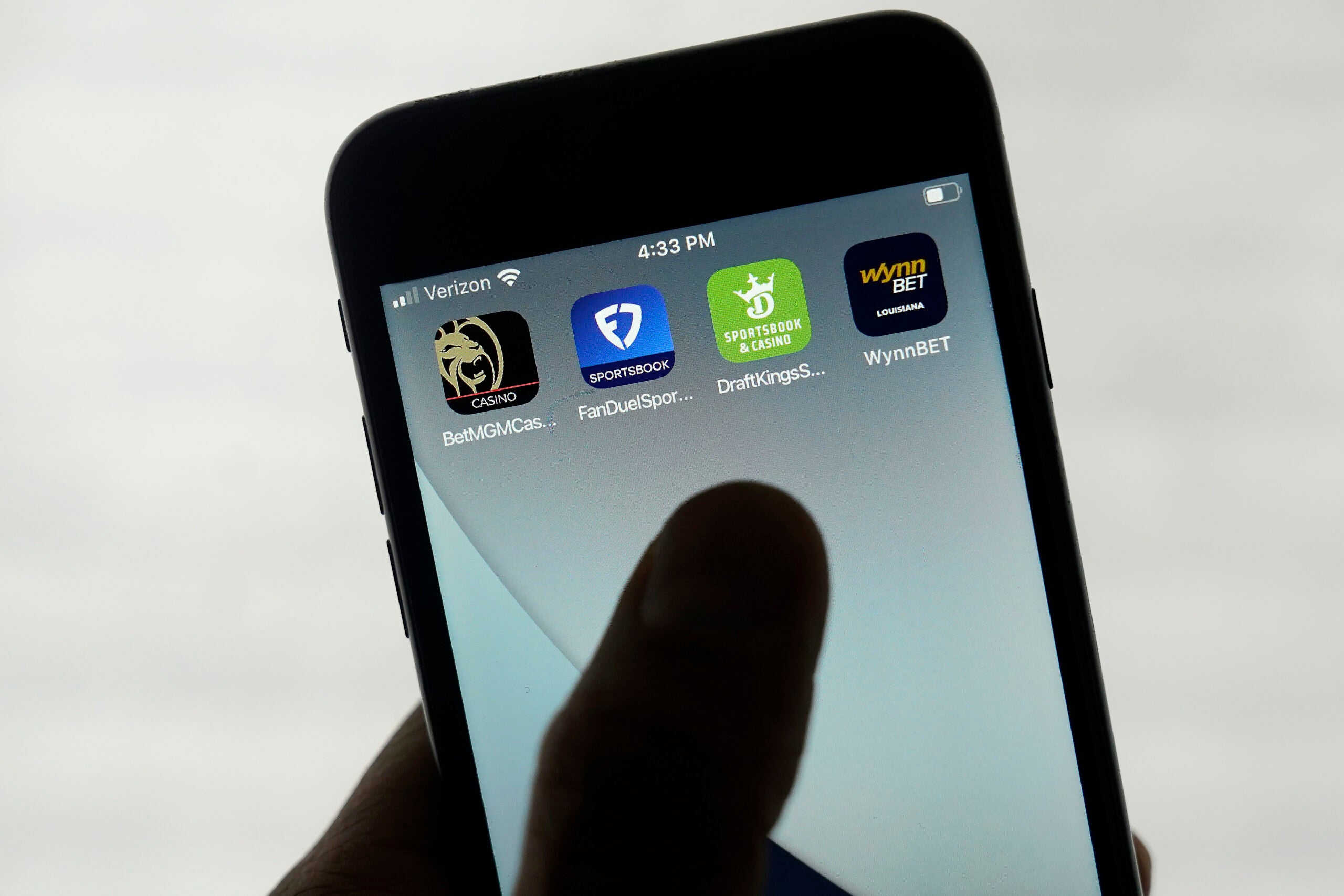By many metrics, sports gambling has been a success in Wisconsin.
Four of the state’s six sports book operations opened last year and made more money than expected, according to early findings from the Administrator of the Wisconsin Division of Gaming. The industry is growing rapidly nationwide, with sports betting generating nearly $11 billion in revenue in 2023. Americans are set to wager around $35 billion this football season alone.
But along with that success, a Wisconsin advocate and therapist told WPR’s “Wisconsin Today” that problem gambling is also on the rise.
Stay informed on the latest news
Sign up for WPR’s email newsletter.
“We’re getting more calls, either from people concerned about somebody or someone with questions (themselves),” said Rose Blozinski, Executive Director of the Wisconsin Council on Problem Gambling. “When you increase the accessibility … you’re going to have people who are going to try it, and you’re going to have people who are going to get addicted to it.”
Blozinski’s Green Bay-based organization informs the public about the dangers of problem gambling and offers resources to bettors seeking help.
Licensed clinical social worker Doug LaBelle works with the council and told WISN last month the group’s helpline received 15,500 calls last year, a rise from 2021. And he said it’s likely to be higher this year.
Blozinski emphasized that problem gamblers make up a small percentage of the number of people that place bets.
“We don’t tell people not to gamble,” Blozinski said. “We just want them to be aware of what the risks are, what the warning signs are and how to make some healthy choices so that you don’t get addicted.”
Why sports gambling presents unique ways to become addicted
Congress passed a law barring most forms of state-authorized sports gambling in 1992. The Supreme Court brought it back in 2018, allowing states to make their own sports betting rules.
But sports betting today is vastly different than in past decades. Online sportsbooks like DraftKings and FanDuel can allow bettors to make wagers using a smartphone app and in real time, throughout a game.
These apps can send notifications to prompt players to make bets during the day and prompt users to make parlays: a series of multiple wagers tied to the same bet but with much higher odds of failure — but higher payouts.
“It’s become really ingrained in our everyday lives,” said Munther Barakat, the Director of Behavioral Health Therapy at Aurora Psychiatric Hospital. “The way you watch (TV), even the way sports gambling is advertised on TV and mentioned by sports announcers while games are on. They mention certain bets … it gets really easy for people to start gambling.”
Sports betting in Wisconsin is technically restricted to bettors who are physically present at certain casino grounds throughout the state. But WMTV reported in February that some Wisconsin gamblers are able to use workarounds to illegally wager on sports online, off of tribal land.
Barakat said that gambling can become addictive because it alters a person’s brain chemistry and is engineered to be an activity a bettor will want to repeat.
“You don’t know when you’re going to be reinforced, when you’re going to win a bet, when you’re going to lose a bet,” Barakat explained. “Maybe next time you win it’s after the fifth time, or next time it’ll be the first bet that you’ll win. That is the most powerful form of reinforcement that increases the likelihood you’ll engage in that behavior again.”
Concern grows for increase in younger men gambling
Another concern among mental health experts is a rise in new, younger gamblers.
Advertising spending for online sports betting has ballooned in recent years, with online sportsbooks jumping from spending less than $100 million in 2018 to nearly $1.4 billion just four years later.
An analysis from research firm Ipsos found nearly 40 percent of bettors are under the age of 35. But the head of the National Council on Problem Gambling told Pew Research in 2022 that he was particularly worried about a growth in even younger bettors, ranging from 18 to 24 years old.
A poll from September found that men under 45 gamble online two-and-a-half times more than average, and men under 30 show signs of problematic online gambling at a rate more than triple that of the overall population.
Given that environment, the Wisconsin Council on Problem Gambling provides presentations to high school students on the risks of gambling. Blozinski told WPR that it’s important to warn teens about gambling.
“We just want them to be aware of what the risks are, what the warning signs are, how to make some healthy choices so that you don’t get addicted,” Blozinski said. “The younger you start gambling — even playing a game of poker — the higher chance you have of becoming addicted to gambling later down the road.”
Warning signs of problem gambling
Blozinski and Barakat encourage people to watch for changing behavior with a person’s gambling — or their own.
“If you’ve always spent a certain amount of money, say $50, and you always stick to that and all of a sudden, you’re betting $100 or $150. That’s the first sign that you’re starting to cross that line,” Blozinski said.
Her organization lists the desire to win money back or “chasing losses,” restless or irritable feelings when trying to reduce gambling and feeling out of control as warning signs or problem gambling.
Barakat said people with problematic gambling habits can display a range of symptoms.
“They experience many family issues, money problems … people who experience gambling addiction, their emotions are unstable and oftentimes directed by when they win (and) times when they lose,” Barakat explained. “Because of the unpredictability of (gambling), it creates instability.”
Barakat said one key part of addressing problem gambling is to create a support system and seek the help of a mental health professional.
“You want to help the patient understand that they’re on this journey,” Barakat said. “Generally they are getting better, but there’s going to be these times that they may relapse or they may have these urges. The point of it is, we’re going to keep practicing and keep reframing. Because what we’re trying to do is we’re trying to restructure and essentially reconnect our brain transmitters to go against what we did with regards to the gambling in the first place.”






